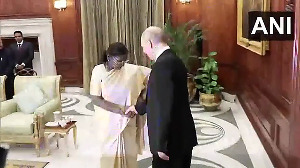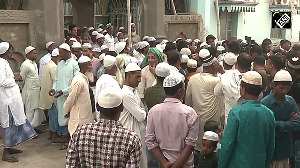It has always been perceived that cancer is generally restricted to the more affluent class in comparison with the poorer people. This is a myth and a recent report in Lancet has busted it. Sriram Balasubramanian reports.
India's biggest nemesis has been cancer. In a country which has inequality rising by the day despite rapid economic progress, there have been various issues such as malnutrition, poverty and hunger.
Among those issues, cancer would be one of the most important of them. Besides the nature of the disease itself, the affordability of the medical treatment, the care given by society as a whole are issues that need to be addressed urgently.
A recent report published in the Lancet (titled "Cancer Mortality in India a national representative survey) highlights the major issues confronting cancer patients in India. The lead author of the report, which is being funded both by the Bill and Melinda Gates foundation and the US Institutes of Health, Dr Prabhat Jha says, "In India 600,000 people had lost their lives last year. In that 400,000 were in the middle age group (30-69) whereas 200,000 people were in the category above 70."
The two major findings of the report according to Dr Jha is that "a) 70 percent of the cancer affected patients were middle age b) Death rate is higher for the undereducated poor people in comparison with the richer ones."
Both these findings are not all surprising. It is frightening to note that 70 percent are middle age people but the starker thing is also that undereducated poor people are getting affected it. It has always been perceived that cancer is generally restricted to the more affluent class in comparison with the poorer people.
This is a myth and this finding has busted it. Dr Jha says "significant parts of rural India are not educated, this lack of awareness and early detection has increased the number of cancer cases". In addition this, there is also a bigger issue and a more systemic issue with rural people, it's the cost of cancer treatment.
According to the Indian Statistical Institute in a July 2011 paper, the average cost of a cancer patient (inclusive of radiotherapy, chemotherapy and others) in AIIMS (India) is Rs 1,602 per week. The costs of a seven-week radiotherapy course are Rs 8,184 and the average economic burden for a person being treated at AIIMS comes to around Rs 36,812.
Now in a country which says that Rs 32 per day is a poverty estimate, you think most of the rural household can afford this basic treatment? Besides this, how is it possible for the rural household to afford for continuous cancer treatment? Affordability and cost of treatment is one of the basic reasons for the rise in the number of cancer cases across rural India.
In addition, it is also the nature of the disease that makes it even more frightening. The disease in its entirety is a very complex disease because it requires continuous treatment. Contrary to public perception, someone diagnosed with cancer does not mean that person's life has come to a standstill. There are various degrees of cancer and successive treatments can cure cancer at various stages.
However, the nature of the disease requires and demands two things. One is the need for money for treatment. Second, is the empathy from people. Empathy and care is part of the Indian fabric.
However, in such cases, there seems to be a general trend of castigating people who have had cancer. This castigation is not good since winning cancer is more to do with the brain than the body. The psychological help and motivation can do wonders for someone to recover from cancer.
Even though closely knit families in Indian societies play a huge role in helping their own kin in such circumstances, such magnanimity is sometimes not shown outside. Our inner apprehensions (sometimes inaccurate knowledge of the nature of the disease) make us castigate them from our mainstream activities. People's castigation of others who are affected by cancer comes from a lack of awareness from even the educated elite.
This leads to the other point mentioned by Dr Jha as part of his findings. Dr Jha categorically says "70 percent of the patients are from the age 30-69. It is affecting the youngsters of the country more than the older ones. It could be due to younger age structure and also due to excessive tobacco use among youngsters" and adds "In the western world, half of cancer patients are above the age of 70".
This fact is telling. It reflects a clear lack of awareness among the youth of the country who despite education, don't seem to have learned much from it about cancer awareness. Considering that India is a very young nation, the greater number of youngsters is understandable but the magnitude of this figure is disturbing. There has to be a concerted effort by the establishment to help people affected by cancer.
In all fairness to the government, there have been processes in place however much the implementation is a question to be answered. The government initiated the National Cancer Control Programme first in 1975-76. This programme at present oversees 25 regional cancer research centres in India which focus on cancer detection and diagnosis, provision of therapy, after care and rehabilitation, education and training.
In addition, they also focus on developing oncology wings in all the medical colleges across the country to aid in this process. There is also a district programme which has been initiated since 1991 which gets a grant of Rs 90 lakh over a period of five years. Moreover, there has been concerted effort by the NGO's and other organisations to ramp up the cancer awareness and prevention across the country. However, the issues with these government schemes seem to be the implementation. There has to be a more robust and concrete examination of the systems in place and the delivery treatment mechanism needs to be more refined. In addition, there has to be greater education about the disease across the polity.
So what is Dr Jha's solution to this in the short term? He says "increasing tobacco taxes is the single most important step India needs to take. Many countries have done this and it has been effective. An example would be France where the tobacco consumption decreased and reduced lung cancer by half almost". In addition Dr Jha says "increase in VAT by state governments is not good enough and so are super specialty hospitals". Surprisingly, when questioned on the ban of cigarettes in public, he says "it does work since it has worked in countries such as Australia and Canada"
In retrospect, the findings of the report and the general state of cancer in India have proven one thing; reform in the health sector, especially access to cancer treatment, is direly needed. There has to be concerted effort from the government and the private sector to help people tackle with high treatment costs and urge society to show more care towards the needy.
Time is running out, it's high time India wakes up.










